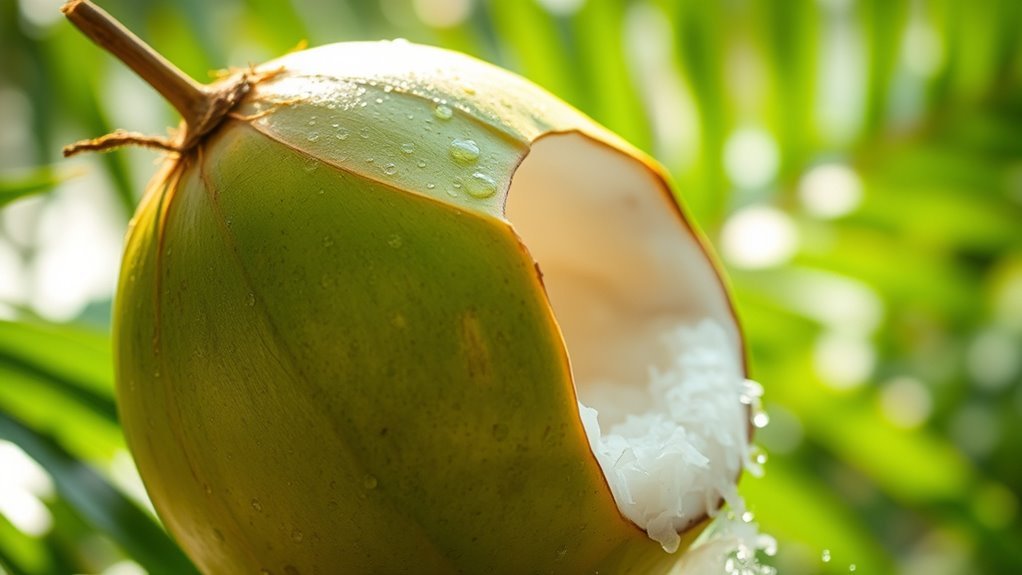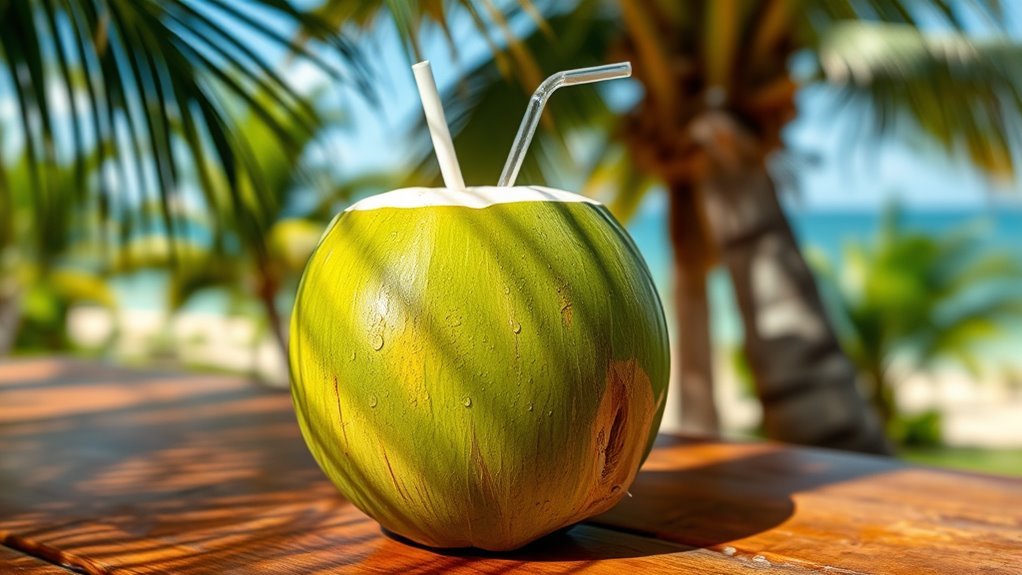Coconut water isn’t typically considered keto-friendly due to its carbohydrate content. An 8-ounce serving has about 9 grams of carbs and 6 grams of natural sugars, which can push you out of ketosis. While it’s great for hydration, especially with its electrolytes, consuming it regularly may hinder your dietary goals. You can still enjoy coconut water occasionally, but diluting it or monitoring your intake is key. There are other hydration options that might suit your keto lifestyle better.
Nutritional Profile of Coconut Water

When considering the nutritional profile of coconut water, it’s essential to look at its key components. This invigorating beverage is primarily composed of water, making it an excellent hydration source. Coconut water benefits include its rich electrolyte content, particularly potassium, which can help replenish lost fluids after exercise. Additionally, it contains smaller amounts of sodium, calcium, and magnesium, all contributing to effective hydration. Unlike sugary sports drinks, coconut water offers a natural alternative without excessive calories. However, while it’s a great choice for hydration, it’s important to be mindful of its carbohydrate content if you’re following a strict diet. Overall, coconut water can be a delightful, nutritious option for those seeking a revitalizing drink while staying hydrated.
Carbohydrate Content Explained

When considering coconut water, it’s essential to understand its carbohydrate content, as this can affect your keto diet. With a moderate sugar content, you’ll want to analyze how these carbohydrates might impact your state of ketosis. Let’s explore the nutritional profile, sugar levels, and their overall effect on your ketogenic journey.
Nutritional Profile Overview
Although coconut water is often praised for its hydrating properties, its carbohydrate content is a key factor to evaluate, especially for those following a ketogenic diet. Typically, 8 ounces of coconut water contains around 9 grams of carbohydrates. While this can provide some coconut benefits, it may hinder your ability to maintain ketosis, which generally requires limiting your carb intake to 20-50 grams per day. If you’re seeking hydration alternatives that fit within a keto framework, you might consider options like electrolyte-infused water or bone broth. Additionally, monitoring lactose-rich dairy products is crucial for success when considering your overall carbohydrate intake. Balancing hydration needs with dietary goals is essential, so weigh the benefits of coconut water against its carb content before incorporating it into your routine. Ultimately, informed choices empower your freedom in dietary decisions.
Sugar Content Analysis
Understanding the sugar content in coconut water is vital for those monitoring their carbohydrate intake. Coconut water contains natural sugars, primarily fructose and glucose, which can impact your diet. Each cup has about 6 grams of sugar, which could be a concern if you’re on a strict keto diet. These sugar types have a relatively low glycemic index, meaning they won’t spike your blood sugar as dramatically as refined sugars, but they can still add up. If you’re looking for hydration without the carbohydrate load, it’s important to reflect on portion sizes. Ultimately, if you enjoy coconut water, moderation is key. Balancing your choices allows you the freedom to enjoy it while staying aligned with your dietary goals. Additionally, understanding carb limits can help you make informed decisions about including coconut water in your keto diet.
Impact on Ketosis
The sugar content in coconut water can considerably affect your ability to maintain ketosis. With around 9 grams of carbohydrates per cup, it can disrupt ketosis effects, pushing your body out of its fat-burning state. If you’re committed to a ketogenic diet, it’s essential to monitor your carb intake closely. While hydration strategies are crucial, consider low-carb alternatives like electrolyte-rich broths or unsweetened herbal teas. Balancing hydration without compromising your keto goals is key. Remember, every gram counts toward your daily limits, so prioritize beverages that align with your ketogenic lifestyle. Ultimately, choosing wisely can help you stay in ketosis while enjoying hydration that supports your overall well-being. Additionally, understanding personal carb limits can further enhance your success on the ketogenic diet.
Coconut Water vs. Other Hydration Options

When considering hydration options, it’s important to compare coconut water with other beverages based on their nutritional profiles and electrolyte content. You might find that flavors and personal preferences also play a key role in your choice of hydration. Understanding these factors can help you make informed decisions that align with your dietary goals.
Nutritional Comparison Overview
While coconut water is often marketed as a revitalizing and healthy hydration option, it’s essential to compare its nutritional profile with other beverages to determine its place in a balanced diet. Coconut water boasts several coconut benefits, including natural sugars and electrolytes, making it appealing for post-exercise hydration. However, when you stack it against options like plain water or herbal teas, the calorie and sugar content can be a concern, especially if you’re following specific hydration strategies. For instance, while coconut water provides more flavor and nutrients, it may not be the ideal choice for those aiming to minimize calorie intake. Understanding these differences helps you make informed choices that align with your health goals.
Electrolyte Content Analysis
Coconut water stands out as a natural source of electrolytes, making it an attractive option for hydration, especially after physical activity. It offers several hydration benefits and helps maintain electrolyte balance. Let’s compare its electrolyte content with other hydration options:
| Beverage | Sodium (mg) | Potassium (mg) |
|---|---|---|
| Coconut Water | 105 | 600 |
| Sports Drink | 110 | 150 |
| Plain Water | 0 | 0 |
| Coconut Milk | 50 | 400 |
Coconut water’s high potassium content supports muscle function, while its moderate sodium levels aid in fluid retention. For those seeking a natural alternative, coconut water can be a revitalizing choice that helps you stay hydrated and replenish essential electrolytes effectively.
Flavor and Preference Factors
Have you ever wondered how the flavor of coconut water compares to other hydration options? Coconut water boasts a unique, slightly sweet flavor profile that many find invigorating. This natural beverage can appeal to those with specific taste preferences, offering a tropical taste that contrasts with traditional sports drinks or flavored waters. While coconut water is lower in sugar than many commercial options, its distinct flavor might not be for everyone. Some prefer the crispness of mineral water or the sweetness of electrolyte drinks. Ultimately, your choice should align with your personal taste and hydration needs. Exploring various hydration options can help you find what satisfies your palate while supporting your lifestyle.
Impact of Coconut Water on Ketosis
Although many people enjoy coconut water for its invigorating taste and hydrating properties, its impact on ketosis can be complex. If you’re focusing on ketosis maintenance, here are a few aspects to evaluate:
- Coconut water contains natural sugars, which can affect your carb intake.
- It’s relatively low in calories but can still impact your daily macros.
- The electrolytes in coconut water can be beneficial for hydration strategies, especially during workouts.
- Moderation is key; a small amount might not disrupt ketosis, but overindulgence could.
- Being aware of carbohydrate content is essential for making informed dietary choices, especially for maintaining ketosis.
Ultimately, if you’re mindful of your carb limits, coconut water can still fit into your lifestyle. Just remember to balance it with your overall dietary goals to maintain that desired state of ketosis.
How to Incorporate Coconut Water Into a Keto Diet
While you may be cautious about your carb intake on a keto diet, incorporating coconut water can be done thoughtfully. Start by using it as an occasional hydration option rather than a daily staple. With its natural electrolytes, coconut water benefits those who engage in intense workouts or need to replenish after sweating. Consider mixing it with water or using it in smoothies to balance carbs while enjoying its flavor. Another idea is to use it in recipes for keto friendly drinks, like a revitalizing tropical mocktail. Just remember to track your carb intake to guarantee it fits within your daily limits. This way, you can savor the unique taste of coconut water without compromising your keto goals.
Alternatives to Coconut Water on Keto
If coconut water isn’t your go-to on a keto diet, there are several alternatives that can provide similar hydration and electrolyte benefits without straying from your carb limits. Here are some keto-friendly beverages to evaluate:
- Electrolyte drinks: Look for sugar-free options with essential minerals.
- Bone broth: Rich in electrolytes and nutrients, it’s a savory alternative.
- Herbal teas: Naturally low in carbs and can be enjoyed hot or cold.
- Sparkling water: Add a splash of lemon or lime for flavor without the carbs.
Staying hydrated with these options is crucial, especially since the body excretes more water and electrolytes on a ketogenic diet. These hydration alternatives not only keep you refreshed but also align with your keto lifestyle. Exploring these options helps you stay on track while enjoying a variety of flavors and benefits.
Frequently Asked Questions
Can I Drink Coconut Water Daily on a Keto Diet?
You can drink coconut water daily, but it’s essential to take into account its carb content. While coconut water boasts benefits like hydration and electrolytes, it may not be fully compatible with a strict keto diet due to its natural sugars. Balance is key; if you enjoy it, monitor your overall carb intake. Enjoy the benefits, but be mindful of how it fits into your daily macros to maintain your keto goals.
Does Coconut Water Contain Any Fat?
Coconut water doesn’t contain any fat, making its nutritional profile quite different from coconut milk or cream. It’s primarily composed of water and carbohydrates, with minimal protein. While it’s hydrating and packed with electrolytes, its lack of fat content means it won’t contribute to your daily fat intake. If you’re looking for healthy fats, you might want to explore other coconut products or sources to meet those dietary needs.
Is Coconut Water Safe for Diabetics?
Yes, coconut water can be safe for diabetics when consumed in moderation. It contains natural sugars but also offers coconut water benefits, like hydration and essential nutrients. Keeping an eye on portion sizes is vital to manage blood sugar levels effectively. Some studies suggest that coconut water may help improve insulin sensitivity, but it’s always best to consult your healthcare provider to tailor dietary choices to your specific health needs.
Can Coconut Water Help With Hydration During Workouts?
Coconut water’s hydration benefits during workouts are almost legendary! It’s packed with electrolytes, making it a great choice to replenish what you lose through sweat. While it can aid in hydration, keep in mind that it’s not a magic potion for workout recovery. Balance it with water and proper nutrition for ideal results. So, if you’re looking for a revitalizing way to stay hydrated, coconut water can definitely be part of your routine.
How Does Coconut Water Taste Compared to Regular Water?
Coconut water’s flavor is subtly sweet and nutty, setting it apart from regular water’s neutral taste. Many people find it invigorating and enjoyable, especially when considering its hydration benefits. It contains electrolytes like potassium, which can enhance hydration compared to plain water. If you’re looking for a tasty alternative to stay hydrated, coconut water might be a great choice, but remember to balance it with your overall dietary preferences and needs.
References
- https://www.healthline.com/nutrition/coconut-water-keto
- https://www.medicalnewstoday.com/articles/323556
- https://www.ncbi.nlm.nih.gov/pmc/articles/PMC6413026/
- https://www.webmd.com/diet/obesity/coconut-water-nutrition
- https://www.dietitian.com.au/coconut-water-and-the-keto-diet/
- https://www.mayoclinic.org/healthy-lifestyle/nutrition-and-healthy-eating/expert-answers/coconut-water/faq-20057867
- https://www.verywellfit.com/coconut-water-4171864


